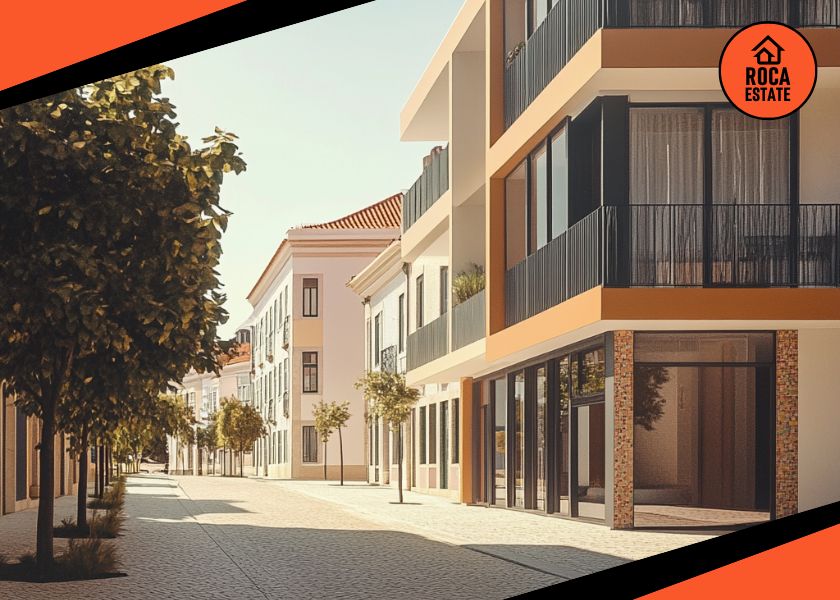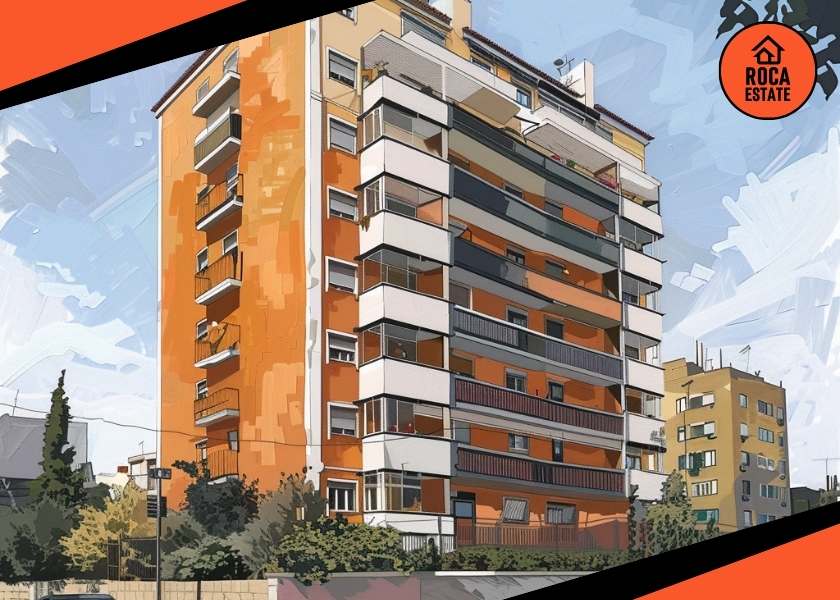Portugal as a Commercial Investment Destination

Portugal has increasingly captured global attention not only as a lifestyle destination but as a serious hub for investment in commercial real estate. With strong economic fundamentals, political stability, and a strategic Atlantic location, Portugal offers an attractive and secure environment for long-term investors.
This article focuses on commercial, not residential, real estate. From logistics to hospitality, the commercial property segment in Portugal presents unique advantages that align with global investor goals for yield, risk diversification, and market resilience.
Strategic Advantages of Portugal for Commercial Property Investors
Portugal offers a combination of structural, legal, and geographic advantages that position it as a prime destination for commercial property investment:
1. EU Membership and Schengen Zone Access
As a full member of the European Union and the Schengen Area, Portugal provides investors with unrestricted access to the European Single Market. This facilitates cross-border transactions, free movement of capital, and simplified legal compliance across multiple jurisdictions.
2. Transparent Legal Framework and Strong Property Rights
Portugal’s legal system is aligned with EU standards and provides a transparent and well-regulated environment for property ownership and transfer. Foreign investors benefit from equal legal protections, including enforceable title registration and access to independent notarial services. The World Bank’s “Doing Business” indicators rank Portugal favorably for contract enforcement and property registration.
3. Political and Economic Stability
Portugal ranks among the most politically stable countries in the EU and consistently scores high on the Global Peace Index (GPI 2024). The country has maintained steady GDP growth, reduced its fiscal deficit, and controlled inflation, making it a predictable and secure environment for asset management and long-term investment planning.
4. Strategic Geographic Location
Located on the Atlantic coast at the southwestern edge of Europe, Portugal serves as a key logistics and trade hub bridging Europe, Africa, and the Americas. Its proximity to major maritime routes and global air corridors enhances the strategic value of commercial assets such as warehouses, ports, and distribution centers.
5. Infrastructure and Connectivity
Portugal boasts a modern infrastructure network including international airports, deep-water seaports, high-speed rail, and EU-standard highways. This underpins the logistics, manufacturing, and tourism sectors, which are major demand drivers for commercial property.
6. Favorable Business Environment
The Portuguese government has prioritized foreign direct investment (FDI) through various incentives, regulatory simplification, and business support services. Portugal ranks 39th globally in the World Bank’s Ease of Doing Business index and offers investor-friendly regimes such as the Non-Habitual Resident (NHR) tax status and Golden Visa program (for eligible CRE investments).
Together, these structural advantages make Portugal a strategically sound choice for global investors seeking secure, income-generating commercial premises within a transparent and accessible EU market.
Resilient Commercial Real Estate Market

Portugal’s commercial real estate market has demonstrated notable resilience and adaptability, driven by structural demand, diversified asset classes, and sustained investor confidence. In 2024, the total volume of commercial property transactions reached €2.3 billion, a 12% increase year-on-year, according to Savills Portugal.
Growth Drivers by Sector:
- Office Market: Lisbon and Porto have shown continued demand for modern, energy-efficient office spaces. Vacancy rates in Lisbon’s prime office zones dropped below 6% in Q1 2024, with rents growing by 4.5% annually (JLL Portugal). Foreign corporations and tech firms have been key occupiers, supported by Portugal’s competitive labor market and quality of life.
- Logistics and Industrial: The logistics sector is experiencing strong expansion due to e-commerce growth and supply chain restructuring. The Greater Lisbon region saw over 250,000 sqm of logistics space absorbed in 2024 YTD, with an average rent increase of 6.8% year-on-year (CBRE Portugal).
- Hospitality and Tourism: Tourism rebounded significantly in 2024, with over 31 million international arrivals, surpassing pre-pandemic levels (Turismo de Portugal). This resurgence has increased demand for hotel and short-term rental assets, especially in Lisbon, Porto, and the Algarve. Occupancy rates across 4-star and 5-star hotels reached 74% nationally in the first quarter of 2025.
- Retail Sector: High-street and shopping center retail in prime urban areas is seeing renewed traction. Retail sales rose 5.1% in early 2025, driven by consumer spending and tourist footfall (Savills Portugal). Mixed-use developments integrating retail, office, and residential functions are also gaining investor attention.
Urban Regeneration as a Value Catalyst
Public and private investment in urban regeneration is a significant factor supporting CRE value creation. Large-scale projects in Lisbon’s waterfront district, Porto’s Campanhã redevelopment, and tourism corridor upgrades in the Algarve are creating new demand for commercial space and infrastructure. These initiatives align with broader EU sustainability goals and ESG investment mandates.
Investor Composition and International Appetite
According to Cushman & Wakefield Portugal, international investors represented 68% of the total investment volume in 2024, with capital inflows primarily from Germany, the United States, the United Kingdom, and the Middle East. Core and core-plus strategies continue to dominate, with increased interest in value-add assets in secondary cities.
These fundamentals demonstrate Portugal’s ability to offer diversified opportunities across multiple CRE segments, backed by strong demand, supply constraints in urban zones, and growing institutional participation. For global investors prioritizing yield, resilience, and EU-market exposure, Portugal presents a credible and strategic alternative to more saturated Western European markets.
Investor Incentives and Tax Benefits

Portugal provides a range of tax incentives and fiscal benefits specifically designed to encourage investment in commercial real estate (CRE). These frameworks make the market attractive not only from a yield perspective but also in terms of operational efficiency and capital preservation.
1. Exemptions on Real Estate Transaction Taxes
Under certain approved investment regimes, commercial premises acquisitions may benefit from partial or full exemptions on Real Estate Transfer Tax (IMT), Municipal Property Tax (IMI), and Stamp Duty (IS). These incentives apply particularly to urban regeneration projects and properties located in designated areas for redevelopment. (PwC Portugal)
2. Capital Gains Tax Relief on Reinvestment
Non-resident corporate investors selling Portuguese CRE assets may benefit from a deferral or reduction in capital gains tax if the proceeds are reinvested in qualifying real estate or productive assets within Portugal. This mechanism supports portfolio rebalancing while preserving tax efficiency. (Deloitte Portugal)
3. Tax-Efficient Investment Vehicles
Institutional and private investors often structure their CRE holdings through Portuguese Special Purpose Vehicles (SPVs) or investment funds. Real estate investment undertakings (Organismos de Investimento Imobiliário – OIIs) benefit from favorable tax treatment, including exemptions on income generated through rental and capital appreciation, provided certain compliance conditions are met. (EY Portugal)
4. Use of Portuguese Companies (LDA) for Asset Management
Establishing a private limited liability company (Sociedade por Quotas – LDA) is a common route for foreign investors managing one or multiple CRE assets. LDAs can access Portugal’s corporate tax regime, benefit from double taxation treaties, and enable tax-efficient repatriation of profits. In 2024, the standard corporate income tax rate remains 21%, with reduced rates applicable to qualifying SMEs.
5. No Wealth or Inheritance Tax for Non-Residents
Portugal does not impose a wealth tax or inheritance tax on non-resident individuals, reducing long-term holding costs and succession complexities for international investors. (PwC Portugal)
6. Depreciation and Deductions
Commercial real estate assets held for leasing purposes may be depreciated annually, typically over a 50-year period for buildings. Additionally, operating costs, maintenance expenses, and municipal charges are deductible from taxable income, enhancing net yield potential. (Deloitte Portugal)
These provisions, combined with Portugal’s transparent legal system and EU-aligned fiscal governance, provide a competitive edge to investors in the commercial property sector. For comprehensive guidance, investors are advised to consult local tax advisors and legal professionals.
Residency Pathways and Business Synergies
Portugal offers several residency options that align with commercial real estate (CRE) investment strategies. While recent legislative changes have altered some pathways, opportunities remain for investors to integrate residency planning with CRE ventures. Global Citizen Solutions
1. Golden Visa Program: Current Status
As of 2024, the Portugal Golden Visa program no longer includes real estate purchases as a qualifying investment. This change, enacted through Law 56/2023, redirects the program’s focus toward other forms of investment, such as capital contributions to funds or cultural projects. (Portugal Homes)
2. D7 Visa: Passive Income Residency
The D7 Visa caters to individuals with stable passive income sources, including rental income from CRE assets. Applicants must demonstrate a minimum monthly income of €870 in 2025 and maintain a Portuguese bank account with a balance equivalent to one year’s income. (Global Citizen Solutions)
Key Requirements:
- Proof of passive income (e.g., rental income, dividends)
- Portuguese bank account with a minimum balance of €10,440
- Valid accommodation in Portugal
- Clean criminal record
This visa provides a pathway to residency for investors who derive income from CRE holdings.
3. D8 Visa: Digital Nomad Residency
Introduced in 2022, the D8 Visa targets remote workers and digital nomads. Applicants must have a monthly income of at least €3,280 and can benefit from Portugal’s favorable tax regime and quality of life. (Get Golden Visa)
Key Features:
- Residency for remote workers with sufficient income
- Access to Portugal’s healthcare and education systems
- Potential tax benefits under the Non-Habitual Resident (NHR) regime
While not directly linked to CRE investment, the D8 Visa allows investors to reside in Portugal while managing their international business interests.
4. Business Synergies with CRE Investment
Investors can establish Portuguese companies (Sociedade por Quotas – LDA) to manage CRE assets. This structure offers benefits such as limited liability, access to Portugal’s tax treaties, and eligibility for various residency programs.
Advantages:
- Efficient management of CRE portfolios
- Potential tax optimization through corporate structures
- Alignment with residency requirements
By integrating business operations with residency planning, investors can optimize their presence in Portugal’s CRE market.
Due Diligence, Legal Process & Purchase Steps
Investing in commercial real estate (CRE) in Portugal requires a thorough understanding of the legal framework and procedural steps to ensure a secure and compliant transaction. This section outlines the critical stages involved in the acquisition process, emphasizing due diligence, legal formalities, and best practices for investors. (Sérvulo)
1. Comprehensive Due Diligence
Before proceeding with a CRE investment, conducting comprehensive due diligence is paramount. This process involves several key assessments:
- Title Verification: Confirming the seller’s legal ownership and identifying any encumbrances or liens on the property.
- Urban Planning Compliance: Ensuring the property complies with local zoning laws and has the necessary permits for its intended commercial use.
- Tax and Financial Review: Checking for outstanding taxes, utility bills, or other financial obligations associated with the property.
- Environmental Assessment: Evaluating potential environmental liabilities, especially for industrial or development sites.
- Structural and Technical Inspection: Assessing the physical condition of the property to identify any structural issues or required renovations.
Engaging legal and technical professionals during this phase is advisable to identify and mitigate potential risks.
2. Legal Framework and Documentation
The legal process for acquiring CRE in Portugal involves several critical documents and steps:
- Promissory Contract (Contrato de Promessa de Compra e Venda): A preliminary agreement outlining the terms of the sale, including price, payment schedule, and conditions precedent.
- Public Deed (Escritura Pública): The formal contract signed before a notary, legally transferring ownership from the seller to the buyer.
- Land Registry (Conservatória do Registo Predial): Registration of the new ownership is mandatory to ensure legal recognition and protection of property rights.
- Tax Registration: Updating the property’s registration with the Tax Authority (Autoridade Tributária) for fiscal purposes. (DLA Piper)
It’s essential to ensure all documents are accurate and comply with Portuguese law to avoid future legal complications.
3. Taxation and Fees
Several taxes and fees are associated with CRE transactions in Portugal:
- Municipal Property Transfer Tax (IMT): Varies depending on the property’s value and type, typically ranging from 5% to 7.5%. (DLA Piper)
- Stamp Duty (Imposto do Selo): A fixed rate of 0.8% applied to the property’s value. (Portuguese Tax Authority)
- Notary and Registration Fees: Costs associated with the public deed and land registry, usually amounting to a few hundred euros.
Buyers should budget for these expenses and consult with tax professionals to understand any applicable exemptions or reductions.
4. Financing and Investment Structures
Foreign investors have several options for structuring their CRE investments:
- Special Purpose Vehicles (SPVs): Creating a Portuguese company (e.g., Sociedade por Quotas – LDA) to hold the property can offer tax advantages and limit liability.
- Real Estate Investment Funds (REIFs): Investing through regulated funds can provide diversification and professional management.
It’s advisable to consult with legal and financial advisors to determine the most suitable structure based on investment goals and tax considerations.
5. Risk Mitigation Strategies
To safeguard investments, consider the following strategies:
- Insurance: Obtain comprehensive property and liability insurance to protect against unforeseen events.
- Warranties and Indemnities: Include clauses in the purchase agreement that hold the seller accountable for undisclosed issues.
- Escrow Arrangements: Use escrow accounts to manage funds securely during the transaction process.
Implementing these measures can help mitigate potential risks associated with CRE investments.
For personalized assistance and to explore curated commercial real estate opportunities in Portugal, contact Roca Estate’s team.
Financing and Investment Structures
Access to flexible and well-regulated financing and ownership models enhances the attractiveness of Portugal’s commercial real estate (CRE) market for foreign investors. From bank loans to fund structures and corporate entities, Portugal offers multiple pathways to finance and legally hold CRE assets efficiently and securely.
Bank Financing for Foreign Investors
Several Portuguese and international banks offer financing options for non-resident investors acquiring CRE assets in Portugal. According to Banco de Portugal, loan-to-value (LTV) ratios can reach up to 60%–70% for commercial assets, depending on the borrower’s profile and the asset’s valuation. Financing is typically available in both euros and foreign currencies, although non-euro loans may be subject to currency risk.
Key conditions often include:
- Comprehensive due diligence on the borrower and the asset
- Stable income projections or lease contracts supporting repayment
- Collateral requirements, often including personal guarantees or mortgage registration
Special Purpose Vehicles (SPVs)
Special Purpose Vehicles are commonly used to isolate financial and legal risks. These entities allow investors to ring-fence individual assets and simplify project-based accounting, taxation, and potential divestment. An SPV is typically incorporated as a Sociedade por Quotas (LDA), offering:
- Limited liability for shareholders
- Flexibility in structuring ownership among multiple partners
- Tax transparency and eligibility for Portugal’s network of over 80 double tax treaties
In 2025, SPVs will continue to be a preferred method for developers and private equity firms investing in hotel, logistics, or office portfolios.
Real Estate Investment Funds (REIFs)
Regulated REIFs offer institutional and private investors access to diversified property portfolios managed under the supervision of the Portuguese Securities Market Commission (CMVM). These vehicles benefit from favorable tax treatment under Portuguese law, such as:
- Exemption from Corporate Income Tax (CIT) on rental income and capital gains, subject to compliance with distribution and reporting requirements
- Reduced withholding tax on income distributed to non-resident investors, depending on tax treaties
Investors may access both open-end and closed-end REIFs, with many funds specializing in commercial segments such as logistics, retail, and mixed-use developments. (CMVM Portugal)
Joint Ventures and Co-Investment Platforms
Joint ventures are increasingly common in the Portuguese CRE landscape, allowing international investors to partner with local developers or operators. These structures offer:
- Shared risk and capital commitment
- Access to local expertise and permitting processes
- Faster market entry with pre-structured assets or projects
Co-investment platforms also facilitate the pooling of funds from family offices or funds-of-funds, offering exposure to large-scale CRE projects in Lisbon, Porto, and the Algarve.
Use of Holding Companies
For investors with multiple assets or long-term operational goals, forming a Portuguese holding company can optimize management and taxation. Holding structures allow:
- Centralized decision-making
- Consolidated accounting and reporting
- Internal financing across projects
Additionally, dividends distributed to non-resident shareholders can benefit from reduced withholding tax under Portugal’s tax treaties, provided anti-abuse rules are met.
Legal and Tax Advisory is Essential
Choosing the appropriate financing and ownership structure requires careful consideration of regulatory compliance, operational flexibility, and tax exposure. Investors are strongly advised to consult with licensed Portuguese advisors to ensure alignment with local law and international standards.
Market Outlook and Strategic Locations

Portugal’s commercial real estate (CRE) sector is poised for sustained growth in 2025, driven by favorable macroeconomic conditions, increased investor confidence, and strategic regional developments. The market is experiencing a resurgence across key asset classes, with notable activity in retail, hospitality, logistics, and data infrastructure.
Market Outlook: Positive Trajectory Across Sectors
Leading real estate firms project an 8% year-on-year increase in CRE investment volumes, potentially reaching €2.5 billion in 2025. This growth is underpinned by economic expansion, declining interest rates, and a convergence of buyer and seller expectations. Retail and hotel sectors are anticipated to attract the most investment for the third consecutive year. (CBRE)
Retail emerged as the leading sector, accounting for around €1.13 billion, with significant deals involving shopping centers and supermarkets.
Strategic Locations: Key Investment Hubs
Lisbon: The capital city continues to be a focal point for CRE investment, particularly in the office and retail sectors. The office market in Greater Lisbon experienced a 120% year-on-year increase in occupancy between January and November 2024, indicating robust demand for high-quality spaces. (Cushman & Wakefield Portugal)
Porto: As Portugal’s second-largest city, Porto offers attractive opportunities in logistics and industrial property, supported by its strategic location and infrastructure.
Algarve: Known for its tourism appeal, the Algarve region is witnessing increased investment in hospitality and retail properties, catering to both domestic and international visitors.
Sector-Specific Trends
- Retail: The retail sector remains resilient, particularly in food and essential retail segments. Despite broader economic changes, retail properties continue to serve as stable, cash-generating assets.
- Hospitality: The hotel sector is expected to perform positively, aligning with the substantial growth experienced in 2024. Sustainability and authentic experiences are becoming central themes in new developments.
- Industrial and Logistics: The trend of industrial nearshoring is benefiting the industrial and logistics sectors, with increased demand for high-quality facilities. (CBRE)
- Data Infrastructure: Investments in data centers are positioning Portugal as a strategic location for data infrastructure, supporting the growing demand from tech and AI companies.
Risks and How to Mitigate Them

While Portugal’s commercial real estate (CRE) market offers compelling investment potential, it is essential for investors to adopt a realistic and informed approach to risk. A well-structured risk management strategy is crucial for preserving capital and ensuring stable returns in a dynamic economic environment.
1. Regulatory and Policy Risk
Portugal has undergone several regulatory changes in recent years, including amendments to the Golden Visa program and new restrictions on short-term rentals in high-density urban zones. These shifts can affect asset use, eligibility for incentives, and future exit strategies.
Mitigation Strategy:
- Stay up to date with legislative updates through local legal counsel.
- Structure investments with built-in flexibility for asset repurposing.
- Monitor policies published by AIMA (Portuguese Immigration and Borders Authority) and relevant municipal authorities.
2. Tenant Risk and Occupancy Volatility
Commercial assets depend heavily on tenant quality and lease stability. In sectors like retail and office, economic slowdowns or changing work models can lead to increased vacancy and reduced rental income.
Mitigation Strategy:
- Conduct tenant due diligence, including credit scoring and business continuity assessments.
- Favor multi-tenant assets or sectors with strong demand, such as logistics or healthcare.
- Implement active asset management to maintain high occupancy and lease renewals.
3. Market Liquidity and Exit Risk
Compared to more mature CRE markets, Portugal’s liquidity can vary significantly depending on asset type and location. Illiquid submarkets or niche asset classes may present challenges during divestment.
Mitigation Strategy:
- Focus on core or core-plus assets in prime locations (e.g., Lisbon, Porto, Algarve).
- Work with established real estate brokers and exit advisors.
- Maintain updated valuations and liquidity forecasts.
4. Construction and Development Risk
Development projects face execution risks, including delays in licensing, construction cost overruns, and contractor reliability. In 2024, construction input costs increased by 5.8% year-on-year, impacting project margins. (INE Portugal)
Mitigation Strategy:
- Partner with experienced local developers.
- Secure fixed-price construction contracts where possible.
- Conduct zoning and permitting due diligence before acquisition.
5. Currency Exchange Risk
For investors with base currencies outside the Eurozone, fluctuations in the EUR exchange rate can affect return profiles and repatriated income.
Mitigation Strategy:
- Use hedging instruments such as currency forwards.
- Diversify holdings across Euro-denominated assets.
- Consider euro-based financing to naturally offset currency exposure.
6. Environmental and Climate Risk
Coastal areas and older buildings face increasing scrutiny around environmental regulations and resilience. ESG compliance and sustainability certifications are becoming critical for institutional capital.
Mitigation Strategy:
- Invest in green-certified assets (e.g., BREEAM, LEED).
- Conduct environmental audits as part of due diligence.
- Prioritize properties with energy-efficient systems and compliance with EU taxonomy requirements.
7. Geopolitical and Macroeconomic Uncertainty
While Portugal is relatively insulated from global geopolitical tensions, factors such as energy price volatility and interest rate shifts can influence CRE performance. According to Banco de Portugal’s Financial Stability Report (2024), inflation pressures have eased, but global uncertainties continue to weigh on investment strategies. (Banco de Portugal)
Mitigation Strategy:
- Adopt a long-term investment horizon.
- Diversify sectorally and geographically.
- Stress-test investment models under different economic scenarios.
Portugal’s market remains a strategic and resilient destination for global capital. However, a proactive risk management framework – integrating legal, financial, operational, and environmental analysis – is essential for sustainable success. Partnering with local experts and advisors enhances the investor’s ability to navigate the market with confidence.
Conclusion: Why Now Is a Smart Time to Invest in Portugal’s Commercial Real Estate
Portugal offers a stable, strategically located, and increasingly sophisticated commercial real estate (CRE) market. Its integration within the EU, strong legal protections, competitive tax environment, and investor-friendly infrastructure position it as one of the most attractive CRE destinations in Southern Europe.
In 2024 and moving into 2025, the market continues to show resilience across office, retail, logistics, hospitality, and emerging data infrastructure sectors. With consistent demand in Lisbon, Porto, and the Algarve – and growing interest in regions – Portugal presents diversified opportunities for capital growth and income generation.
Moreover, Portugal’s regulatory clarity, transparent property acquisition process, and evolving visa options (such as the D7 and D8) create natural synergies for investors seeking both asset security and long-term residency in the European Union.
At Roca Estate, we specialize in sourcing and structuring commercial real estate opportunities tailored to international investors. Whether your focus is stabilized income, long-term development, or strategic portfolio diversification, our team provides full-cycle support – from acquisition to asset management.
Get in touch with Roca Estate to explore high-performance commercial investment opportunities in Portugal’s most promising sectors and regions.








































































































